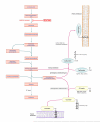Statin therapy and autoimmune disease: from protein prenylation to immunomodulation
- PMID: 16639429
- PMCID: PMC3842637
- DOI: 10.1038/nri1839
Statin therapy and autoimmune disease: from protein prenylation to immunomodulation
Abstract
Statins have been prescribed extensively for their cholesterol-lowering properties and efficacy in cardiovascular disease. However, compelling evidence now exists that statins also have extensive immunomodulatory properties that operate independently of lipid lowering. Consequently, much attention has been directed towards their potential as therapeutic agents for the treatment of autoimmune disease. Modulation of post-translational protein prenylation seems to be a key mechanism by which statins alter immune function. In this Review, the effect of statin therapy on immune function, and how this relates to the pathogenesis of autoimmune disease, is reviewed alongside current opinion of what the key biological targets of statins are.
Figures



References
-
- LaRosa JC, He J, Vupputuri S. Effect of statins on risk of coronary disease: a meta-analysis of randomized controlled trials. JAMA. 1999;282:2340–2346. - PubMed
-
- Maron DJ, Fazio S, Linton MF. Current perspectives on statins. Circulation. 2000;101:207–213. - PubMed
-
- Palinski W. New evidence for beneficial effects of statins unrelated to lipid lowering. Arterioscler. Thromb. Vasc. Biol. 2001;21:3–5. - PubMed
-
- Wick G, Schett G, Amberger A, Kleindienst R, Xu Q. Is atherosclerosis an immunologically mediated disease? Immunol. Today. 1995;16:27–33. - PubMed
-
- Ludewig B, Zinkernagel RM, Hengartner H. Arterial inflammation and atherosclerosis. Trends Cardiovasc. Med. 2002;12:154–159. - PubMed
Publication types
MeSH terms
Substances
Grants and funding
LinkOut - more resources
Full Text Sources
Other Literature Sources
Medical

